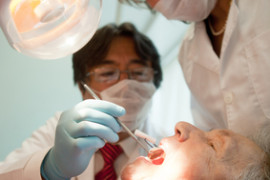In a study published in the Journal of Maxillofacial and Oral Surgery, researchers sampled pieces of the blood vessels during bypass graft surgery and found significant levels of several known oral pathogens in the atherosclerotic plaque.
T. denticola, which was recently determined to play a causal role in the progression of Alzheimer’s disease, was found to be present in 49% of the heart plaque. P. gingivalis, a periodontal pathogen that has already been linked to rheumatoid arthritis and pregnancy complications, was found in 45% of plaque samples. Lower but still significant levels of E. corrodens and C. rectus were also found.
The researchers concluded:
“Our study revealed the presence of significant bacterial DNA of oral pathogens in coronary plaques. This suggests possible relationship between periodontal infection and atherosclerosis and can help devise preventive treatment strategies.”
Published in 2009, this study will go down as a transitional moment in oral-systemic research. Compounded with more recent research—some of which suggests oral bacteria trigger up to 50% of all heart attacks and strokes—there appears to be a substantial influence of oral bacteria, bacterial remnants, and/or the inflammatory response to bacteria and health of blood vessels around the heart.



